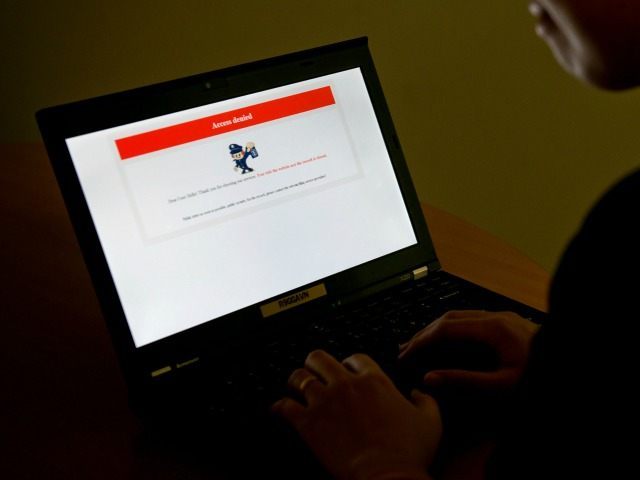The Chinese government is launching an international campaign to keep Islamic State and other terrorist propaganda off the internet following a new push by the jihadi group to recruit Chinese nationals to fight in Syria and Iraq.
“Concerns including the information gap between nations and the spread of terrorist messages and hacker attacks are growing more severe… Only by pushing forward the reform of the existing Internet governance can the cyberspace grow to be an arena that will benefit the people instead of troubling them,” an editorial in Chinese state-run news outlet Xinhua asserts today. The editorial, calling for what the publication calls “internet sovereignty,” is promoting the viability of nations to censor the internet as they see fit, and following public remarks by President Xi Jinping calling for such censorship.
On Thursday, Xi spoke before the World Internet Conference, demanded the world respect China’s rights to censor the expression of its nationals online. “President Xi Jinping asserted the right of each country to choose their own path for cyber development, their own system of cyber regulation and to participate in international cyberspace governance on an equal footing,” Xinhua reports, though it does not quote Xi directly.
In addition to public statements, the UK Independent reports Xi is privately promoting enhanced censorship among its western neighbors. The move to galvanize support for internet crackdowns from nations like Tajikistan and Uzbekistan has alarmed the nation’s ethnic Uyghur population, who claim to be disproportionately the target of state repression. Uyghurs are a Turkic, Muslim people, routinely accused by the Chinese government of engaging in terrorism.
“China is opportunistically using its wealth to advance their repression of human rights globally… but China is also using the recent attacks in Paris and [San Bernardino,] California to get western countries to turn its back on human rights,” Dilxat Rexit, a Uyghur spokesman, told the Independent.
The Chinese government has previously asserted that Uyghur separatists have engaged in jihadi terrorism and cracked down on the practice of Islam in western Xinjiang province, where most Uyghurs live. Indeed, a jihadi outfit, the Turkistan Islamic Party (TIP), is active in Xinjiang, and is allied with Al Qaeda. And while Uyghur activists may see new attempts to crackdown on internet speech and Islam as direct threats to them, Islamic State activity does not appear to be targeted exclusively to China’s Uyghur Muslims.
The Islamic State’s boldest overture to Chinese nationals so far has been the release of the new song “I Am Mujahid,” the first such jihadi anthem (nasheed) in Mandarin. Its lyrics urge jihadis to find death on the battlefield and join their “Muslim brother” in the Middle East.
Uyghurs do not speak Mandarin, making it unlikely the video is intended for them. China’s ethnic Hui minority does, however, the largest Muslim population in China apart from the Uyghurs.
Another Islamic State video targeting China demands viewers begin to pay Raqqa, the “capital” of the Islamic State, the jizya, or punitive infidels’ tax. As Uyghurs are Sunni Muslims, they should not be expected to pay the jizya, meaning the video was intended for a different audience.
As a result, China appears to be treating the threat of jihadi terrorism as less of a Uyghur issue and more of an international one. “The international community should stand closer together and cooperate to jointly strike against all forms of terrorism,” Foreign Ministry spokeswoman Hua Chunying said in a statement following the release of “I Am Mujahid.” Before Xi’s speech in favor of internet censorship, Chinese Minister of Public Security Guo Shengkun demanded the international community crackdown on audio and video materials uploaded online by terrorist groups, urging Chinese government officials to “fully understand and accurately grasp” the effectiveness of such propaganda. Guo demanded his agency “further deepen the crackdown against violent, terrorist activities; carry out a crackdown and punish the dissemination of audio and video containing terrorism online, and people who illegally enter the country to conduct terrorism.”
That is not to say Beijing has moved beyond monitoring Xinjiang. The head of the Xinjiang Internet Information Office, Luo Fuyong, called the internet in an essay earlier this month the “main battleground for ideological struggles” and demanded close censorship on online materials. China has suggested that hundreds of its nationals have left China to fight for the Islamic State, arguing that most of these are Uyghurs.

COMMENTS
Please let us know if you're having issues with commenting.